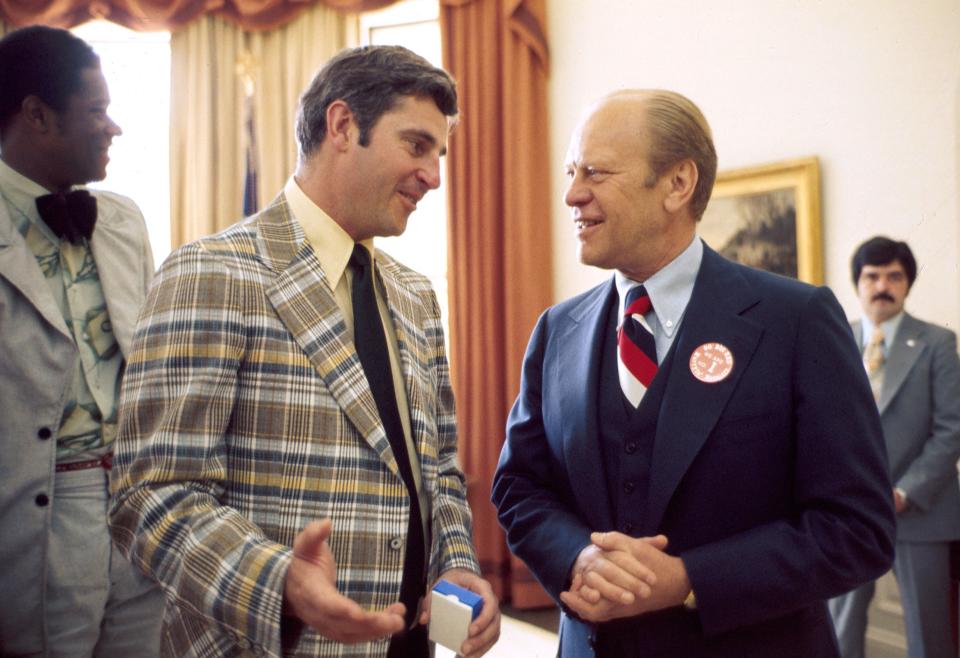Column: We could use a guy like Gerald Ford, our only unelected president, today
- Oops!Something went wrong.Please try again later.
- Oops!Something went wrong.Please try again later.
- Oops!Something went wrong.Please try again later.
- Oops!Something went wrong.Please try again later.
On Aug. 9, 1974, Richard Nixon became the only president to resign from office. Gerald Ford became the only unelected president. Portrayed as an obtuse klutz, Ford became the butt of late-night comedians’ jokes.
"An Ordinary Man," by Richard Norton Smith dispels this popular narrative. Ford’s mother took her newborn son from Omaha to her parents’ Grand Rapids home, fleeing her abusive, alcoholic husband. His mother remarried; Ford grew up in a stable household before starring on the Michigan University football team.
After attending Yale Law School, he enlisted in the Navy. After the war, he started a law practice but was quickly drawn to politics. In 1948, he successfully challenged an isolationist Republican incumbent congressman. He rose steadily through Republican ranks, becoming minority leader in 1965.

A pro-business conservative, he voted in favor of Civil Rights legislation and favored the Equal Rights Amendment. A staunch anti-Communist, he backed the Vietnam War. By October 1973, with Watergate dominating the headlines, Vice President Spiro Agnew resigned over allegations of tax evasion and bribery. Under the recently passed 25th Amendment, Nixon picked Ford to replace him, subject to congressional approval. His reputation for hard work, fairness and congeniality as minority leader won him easy confirmation.
By August of 1974, with impeachment imminent, Republican support for Nixon evaporated. “Our long national nightmare is over;” the 38th president pledged transparency, and an end to the secretive imperial presidency.
His choice for vice president was the liberal Republican Nelson Rockefeller, former New York governor and presidential hopeful. The honeymoon was short-lived, however. Ford’s stunning decision to pardon Richard Nixon a month later led to accusations of a corrupt bargain. Smith, however, finds no evidence for any such quid pro quo, simply stating that Ford wanted to move forward. Years later, many of Ford’s critics acknowledged a prolonged criminal trial would have further divided the nation.
With persistent inflation and American businesses struggling with increasing costs and foreign competition, America entered its worst recession in 40 years. We were still unprepared for another energy crisis. Ford wanted tax and spending cuts, but Democrats balked after increasing their majorities that fall.
In the spring of 1975, with the fall of Saigon weeks away, Congress denied further aid to the beleaguered South Vietnamese Army. Ford, with his Secretary of State Henry Kissinger, continued détente with the Soviet Union over arms control, cultural exchanges and human rights. In an interview with 60 Minutes’ Morley Safer, Betty Ford shared her battles with breast cancer and being a politician's wife. Americans admired her frankness and courage.
By the end of the year, with the economy showing signs of improvement, Ford decided to seek a term in his own right. He faced a stiff challenge on the right by California Gov. Ronald Reagan. To mollify conservatives, Ford dropped Rockefeller from the ticket in favor of Sen. Bob Dole, then a conservative firebrand. He trailed his Democrat challenger former Georgia Gov. Jimmy Carter by nearly 20 points.
A virtual unknown, Carter used his Washington outsider status to trounce his rivals. Raising doubts about his rival’s experience, Ford nearly closed the gap. Carter narrowly prevailed, sweeping the South while edging Ford in key industrial states. Ford would not seek office again, though Reagan briefly considered him as his running mate in 1980.
More than just a caretaker president, Ford restored our trust in government in the midst of social and economic turbulence. That he did so in the face of a skeptical public and hostile Congress is even more remarkable. We could use more like him today.
Michael Hartnett is a resident of Bloomington.
This article originally appeared on The Herald-Times: Column: Gerald Ford was more than a caretaker president

